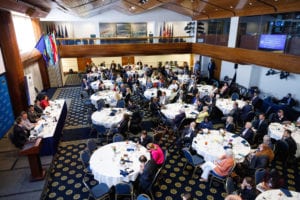By Dr. Bleddyn Bowen
SpaceWatch.Global is delighted to work with Bleddyn Bowen as its columnist. Bleddyn contributs his column every quarter.
 On 25-26th June the Secure World Foundation convened their inaugural Summit for Space Sustainability in Washington, DC, with SpaceWatch Global participating as a media partner for the event. I attended the event and collected some thoughts in response, views which are not representative of the entirety of the summit or everything covered by the presenters mentioned below.
On 25-26th June the Secure World Foundation convened their inaugural Summit for Space Sustainability in Washington, DC, with SpaceWatch Global participating as a media partner for the event. I attended the event and collected some thoughts in response, views which are not representative of the entirety of the summit or everything covered by the presenters mentioned below.
A prevalent theme during the summit was the issue of debris mitigation and removal, and with good reason. Orbital debris is a chronic issue facing satellite operators and everyone on Earth who increasingly relies on space-based data and services, and as mitigation guidelines continue to be half-heartedly pursued and removal measures still only part of research and development operations. The problem is only worsening, though some progress has been achieved on the diplomatic front.
The week prior to the Summit, as the result of a u-turn by Russia following Chinese fears of being seen as a ‘bad guy’, the UN’s Committee on the Peaceful Uses of Outer Space (COPUOS) agreed to a landmark deal on Long Term Sustainability Guidelines – 21 points that shape best practices for all actors in space on reducing debris creation, potential collision events, and greater transparency regarding orbital profiles.
Whilst the task of implementation and enforcing the guidelines can only now begin, this in principle is a welcome development and there was certainly a buzz about the Summit as a result. This is a positive step forward in some aspect of norm-building in space after the abject failure of the EU’s Code of Conduct and the perpetually-stalled PPWT (treaty to ban the placement of weapons in outer space) sponsored by Russia and China.

As expected, however, discussion of debris removal floundered on the issue of costs and payments. Most debris presently in orbit is the result of historical American, Chinese, and Russian launches and it is logical that they should pay for the clean-up of their own pollution. However the question of who should pay for the clean-up going forward is a complex issue given the increasingly democratic nature of international relations in space and the presence of more actors in Earth orbit. Naturally, some representatives of space companies called for more ‘incentives’, i.e. more public funds transferred to them, rather than taxes or punishments to coerce environmentally-friendly practices. Terrestrial politics certainly continues into outer space on environmental issues, it seems.
Another panel of great interest to me was on counterspace – or space warfare – capabilities and the relationship with the commercial space sector. Doug Loverro, formerly of the US Air Force, provided an excellent historical context to the issue of space weapons, a context that is often lost in the breathless commentary on space weapons today. Loverro stressed how American space weapons development goes back to the 1950s and have been researched, developed, and on occasion deployed in various forms ever since. The same is true of Soviet, now Russian, anti-satellite capabilities. The sky won’t fall in due to the piecemeal development of anti-satellite capabilities in India and China today, and a conversation is needed on whether specific forms of space warfare are beyond the Pale or simply unacceptable, Loverro argued.
However, I did disagree with Loverro on one point. He claimed that ‘where commerce flourishes, conflict declines’. With more commercial interests and ‘more to lose’ in space, especially in an international context, there should be more breaks on engaging in destructive space warfare behaviour. That logic is plausible, but in my view it is only a half-truth. Whilst that is indeed a consideration, that space warfare will cause more damage and international opprobrium, and may be a reason against engaging in it in the first place, increasing commercial interests and value in space can have precisely the opposite effect.
The belief that trade increases the odds of peace continuing is a common one in International Relations. Yet that argument is a highly contested one with many arguing that increased trade increases the points for friction and conflict between states. Commerce destruction and the choking of trade is after all a major aspect of war at sea, and may well be in space. Conferences on seapower and naval warfare in the early 20th century saw the hopes that commercial maritime traffic could be immune to the horrors of war. Such hopes came to nothing, with several maritime strategists making the point that without the ability to drive the enemy’s trade from the seas, naval warfare would lose much of its purpose.
Attacking the enemy’s economy is a direct rationale and consequence of naval warfare. As space becomes essential to and significant within the economies of states that may go to war against each other. Trade does not necessarily smother the fires of war, if terrestrial experience is anything to go by.
This is in addition to the military reasons for doing so. The military support or force-enhancement services that satellite infrastructures provide for warfare on Earth is already a compelling reason as to why Russia, China, America, and now India have developed kinetic anti-satellite weapon systems, in addition to other methods such as electronic warfare. Space is becoming a target-rich environment – the more that is worth hitting in orbit, the more likely space warfare is to occur.

NASA Administrator Jim Bridenstine gave a keynote address at the Summit made the point that a commerce protection capability may at some point in future may be needed in space due to the parallels provided by the history seapower and maritime strategy. Bridenstine channelled the spirit of Alfred Thayer Mahan, an American naval strategist from the 19th century, and touched on a topic at the heart of my own research
My own disagreement with Loverro on this issue aside, I hope that his historical context and rather sanguine attitude to space weapons made a good impression on the other delegates when doom-laden visions of space security are portrayed in discussions of space weapons development. This is not to say space-weapons should be developed or will necessarily be the answer to all problems, but they will not doom outer space to a realm of perpetual competition either.
I wish to extend my congratulations to the Secure World Foundation on a successful Summit, and for providing a wide range and diversity of speakers, both in terms of backgrounds, citizenship, experience, and perspectives, and I look forward to the next.

Dr. Bleddyn Bowen is a Lecturer in International Relations at the University of Leicester, specialises in space warfare and classical military philosophy, and teaches astropolitics, Cold War history, and modern warfare. He has published in several academic journals and provides advice and insight to practitioners on UK space policy, military doctrine, and European space policy, including to the UK House of Commons Exiting the EU Select Committee. Currently Bleddyn is completing his book manuscript provisionally entitled War in Space: Strategy, Spacepower, and Geopolitics, forthcoming with Edinburgh University Press, and convenes the informal research network The Astropolitics Collective.





